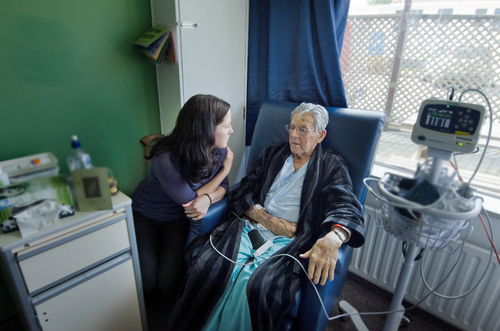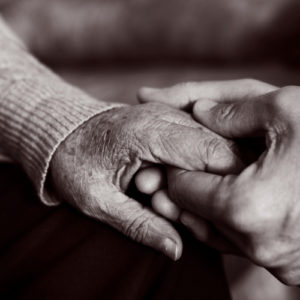Aging and Gerontology Social Work focuses on elderly populations to holistically address their changing physical and mental needs. For most of us who aren’t there yet, learning to truly appreciate the aging process requires a thoughtful look beyond the surface. Experiences with grandparents and elderly people in the community tend to emphasize the physical aspects of aging. In reality, the elderly population faces a complex array of psychological, social, emotional, and financial challenges as well. This understanding lies at the heart of gerontological social work.
Aging and gerontological social workers work with elderly populations to holistically address their changing needs. Aging populations demonstrate greater incidences of depression, social isolation, dementia, and also financial issues. In order to identify these problems and create lasting solutions, gerontological social workers must be sensitive to the impact of race, gender, and socioeconomic status (in addition to age) on each person’s situation. This can encompass a wide range of social services in an equally diverse number of environments, including care facilities, at home, or in the community.
Home-Based Social Services
Gerontological social workers often help clients returning from hospital stays to set up home health care social services. The level of care provided is dependent on the client’s functional level, family support, and access to other healthcare services. This transition provides an opportunity for social workers to gain a clearer picture of their clients’ needs through screening, assessments, and communication with discharging physicians.
Beyond basic health needs, clients with limited mobility and family support may lack the ability to keep up with all of their daily tasks – especially following an injury or the loss of a spouse. When this is the case, the gerontological social worker can connect the client to meal/grocery delivery services, yard care services, and so forth. The challenge on the social worker’s part is not in establishing these services but in identifying the need. Elderly clients are often hesitant to ask for help at home, which is why it’s important for social workers to carefully assess their independence level.
In some cases, clients may need one-time support with technical or logistical tasks. For this reason, social workers must consider the logistical needs of their clients as well as those requiring recurring social services. These needs can be difficult to categorize, as each patient’s unique life events can bring about equally unique challenges, such as:
Paperwork – Applying for insurance or other social services, advanced directives, taxes, legal forms, etc.
Financial planning – Budgeting for and paying off medical expenses, adjusting retirement accounts, etc.
Adaptive equipment setup – Bed rails, bathroom handrails, shower chairs, etc.
Traveling – Arranging travel documents, packing, arranging a house/pet sitter, etc.
Community Social Services
When employed by hospitals and nursing facilities, gerontological social workers have access to a range of powerful tools that social workers can use to meet their clients’ needs. In inpatient care facilities, for example, social workers are often included as part of the patient’s care team. This means that the medical social worker can coordinate with doctors, occupational and physical therapists, nurses, and so forth when helping their clients. The added transparency allows social workers to establish a more accurate perspective of the medical and psychological state of each client, which can be instrumental in choosing the proper course of action.
Specifically, social workers who work in these environments may assist patients with submitting medical documentation, retrieving records, organizing information, counseling, coordinating family and social visits, and much more. As mentioned, social workers often help to establish home caresocial services upon discharge as well. The social worker in the hospital environment should be thought of as an adaptable and supportive patient advocate.
Finally, social workers are also employed by specialized senior care programs. Some of these programs serve a select clientele, like Parkinson’s patients, while others cater to all seniors. Many of these programs offer healthcare, counseling, and mental health social services. The objective is often to keep seniors living at home. Therefore, a social worker employed at a daytime program will have less oversight than one employed at an inpatient facility. These places intake assessments and rapport-building at an even higher priority level.

Family Support Networks
Regardless of where they work, gerontological social workers are trained to take advantage of the family support network whenever possible. In the case of elderly clients, this often means setting up training and education for family members who wish to become home health caregivers for the client. The social worker can contact the occupational therapist, for example, and have them involve the patient’s family members when the social worker is performing ADL (activities of daily living) training with the client, such as dressing and undressing, toileting, navigating stairs, using medical equipment, and so forth.
Ideally, the gerontological social worker acts as a coordinator between the client and their family support. The social worker network in many ways beyond healthcare. For example, the social and psychological benefits of strengthening the family support network can be instrumental. This support often motivates the client to follow the social worker’s recommendations. Furthermore, this coordination can take many forms. It can be scheduling family visits and caregiver training to update family members on the client’s progress in different areas.
Like other specialties under the social work umbrella, gerontological social work encompasses a very broad range of skills and social services. The ability to critically discern a client’s needs from sometimes limited information is at the forefront. With thoughtful, targeted interventions, gerontological social work can drastically improve quality-of-life for any elderly person in need of assistance.
What is the difference between gerontological and geriatric social work?
Geriatrics is a branch of the medical field that focuses on the care and treatment of elderly people. While there’s no definitive age when people are considered to be elderly, geriatrics tends to focus on people who are 65 and over and are eligible for treatment and elder care facilities. Gerontology is the scientific study of the aging process and of the elderly. This field of study focuses on the changes that occur as people enter the middle age group and knowledge in this particular field is growing as the average life expectancy for people overall has increased.
This has given researchers more time to study the effects of the aging process on a variety of different people. The field of gerontology can also help dictate policies that focus on how aging can impact the overall economy as well as the social networks that are in place. Gerontologists are able to offer insights into how to deal with an aging population in today’s world.
So basically, the difference between geriatrics and gerontology is the fact that gerontology encompasses the care of the elderly and their needs that must be met, while gerontology is the study of the elderly, the aging process, and the impact the aging process has on the population in general. Gerontologists are able to provide education to help people better understand the aging process while geriatricians implement ways to care for the elderly population. Gerontology uses a variety of ways to approach the study of the problems and issues that elderly people deal with and seek out overall solutions to help them. Geriatricians deal directly with their patients and the issues the social worker is currently facing.
While geriatrics deals with the care of the elderly and their needs, gerontology is the study of aging and its impacts on the population. Gerontologists perform a support function in educating and understanding aging, while geriatricians deal with the care of these older adults. The difference in approaches between gerontology and geriatrics is a matter of scope. Gerontology uses a multidisciplinary approach to study the problems that the elderly face and seek out big-picture solutions. Geriatricians deal with the issues that their patients may be facing today.

What are some of the challenges of working with geriatric patients?
When working with the elderly can be a very rewarding career, there are special skills that people need to develop to have a successful career in this field. Some of the challenges that people face who currently work with geriatric patients is understanding the mental health issues that seniors face as well as how to promote a healthy lifestyle for them to follow.
When it comes to mental health issues and the elderly, it is easy to understand the physical limitations that aging brings about. In other words, it is easy to understand that older adults have less stamina and are more susceptible to diseases and illnesses, such as diabetes, colds, cases of flu, Parkinson’s disease, arthritis, and even Alzheimer’s disease. But when it comes to their mental health, depression is the biggest issue.
This is many times due to the fact that elderly people become more isolated from the people they love and from socializing and the social worker sometimes self-medicate their depression, which can cause addiction issues. Addiction is actually rising among the elderly population since they are prescribed many different medications and can easily become dependent on some of those.
Their caregivers have to be able to recognize the mental health issues that older adults are suffering from and then find ways to address them through treatment and prevention. A Social Worker will also offer support to not only their elderly clients but the person’s family members as well.
Caregivers and social workers must create a plan to help the elderly deal with their feelings of loneliness and the disconnection that can occur from society in general due to their cognitive decline, depression issues, and diseases older adults may be dealing with.
Caregivers and social workers can create care plans that will promote a healthy social life for elderly people and find ways to increase their mobility, form a healthy lifestyle for them, and create enthusiasm when it comes to social activities. Social workers also have to help elderly clients face the deaths of many of their friends and possibly family members while also dealing with their own mortality.
What skills do you need to work with the elderly?
There are many skills that social workers and caregivers need to possess when dealing with elderly clients. First of all and foremost, it is important for geriatric social workers to be discreet so that their elderly clients feel safe in talking with them about their issues. Social workers must also be respectful of the older adults they are assisting and work to promote a positive and healthy lifestyle for them.
Social workers need to have great communication and listening skills while working with elderly people since many of them are lonely and simply want to chat with someone. It is important for social workers to be able to sit down with their clients and spend time with them while really listening to what they have to say and, in many cases, reading between the lines. This is important when it comes to trying to find out about any underlying issues the client may be having. Geriatric Social workers may be dealing with multiple elderly clients on a daily basis and must give each one time to make them feel like they are important and that someone is there for them.
It is important for geriatric social workers to be very responsive and flexible as well as organized to be able to help their elderly clients organize their own lives. This can include securing transportation for them for doctor appointments or social outings, arranging social activities the elderly people can do that are for their specific issues, and ensuring older adults have proper housing and food to maintain an optimum level of health.

What is the role of social worker in old age homes?
A geriatric social worker is responsible for coordinating the proper care of their elderly clients and a variety of different settings, such as long-term and residential healthcare facilities, hospice situations, outpatient and daily healthcare centers, and even hospitals. There is a growing need for geriatric social workers as the American Geriatrics Society is predicting that about 30 percent of Americans ages 65 and over will need to secure geriatric care by the year 2030.
Here are a few Roles you will play:
- end of life care
- physical or emotional needs
- healthcare social workers
- normal and abnormal aging
- adult protective services
- mental health conditions
- elder abuse
- interdisciplinary team
- residential care facility
- well being
- nursing home
- elderly patients
- financial resources
- care providers
- emotional support
- end of life planning
- elderly adults 2
- older adult clients
- psychosocial assessment
- conduct research
In outpatient settings, geriatric social workers will act as advocates for their elderly clients to ensure older adults receive the proper emotional, social, mental health, and family supports that they need on a daily basis by connecting them to the proper resources that can help them. Geriatric Social workers will also collaborate with each elderly client’s team of doctors and nurses as well as their psychologists, case managers, and any other healthcare staff that work with them on a regular basis to ensure they’re getting the proper care in all areas of their lives.
Related:


